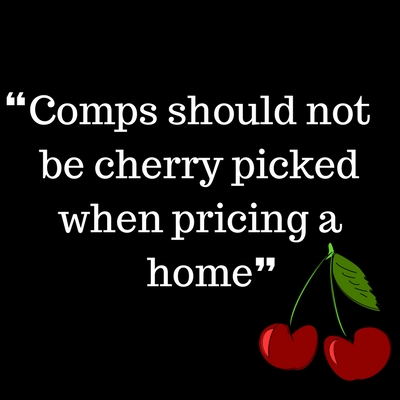Is it the appraiser’s job to support value or report value?
In Jonathan Miller’s Housing Notes blog post this past week he mentioned an article from the online version of the Denver post that is disheartening to appraisers. In the article, Denver real estate agent Steve Danyliw was quoted saying the following:
“Agents are experiencing a higher degree of cancellations and of contracts falling through,” he said. Part of that could reflect offers from buyers that are going above what appraisers are willing to support.”
 Emphasis has been placed on “willing to support”. Comments like this emphasize the misunderstanding of exactly what appraisers do. I’m sure that Mr. Danyliw is not the only agent who believes that it is the appraiser’s job to look at the contract price of the home they are being asked to appraise and then find sales that support that value.
Emphasis has been placed on “willing to support”. Comments like this emphasize the misunderstanding of exactly what appraisers do. I’m sure that Mr. Danyliw is not the only agent who believes that it is the appraiser’s job to look at the contract price of the home they are being asked to appraise and then find sales that support that value.
Low appraisal or high contract?
I recently wrote in this blog about the Top 7 reasons sales contracts come in higher than appraisals because I too saw the same mentality among agents and the general public for that matter. I kept reading articles with titles like “Reasons why your appraisal came in low” or “How to deal with a low appraisal”. One article mentions that both buyer and seller can get blindsided by a low appraisal. The truth is that nobody has to get blindsided by a low appraisal if it is priced correctly, and by that, I mean priced to the market.
A different perspective
In my post I took the opportunity to flip the script, so to speak, and look at the issue from another angle. You see, when you think that the appraiser’s job is to “support” the value that is on the contract then when the appraisal comes in low, of course, you are going to believe that it is the appraiser’s fault.
When you understand that the appraiser’s true job is to measure and report the real estate market and report how your listing fits into it, then you will realize that homes should be priced to the market rather than the other way around where you pick a price and then find sales to back you up.
One of my main goals, whenever I speak at local real estate offices, is to educate agents on the appraisal process. It is my belief that if agents price homes using similar methods to what appraisers use then the contract price is going to be more in line with what other similar homes are selling for and the likelihood of contracts falling through will be diminished.
One of the main problems that I have seen when agents price homes is that a predetermined value for the home is arrived at first. This value could be based on various reasons, including how much of an investment the owner has in the house, or the cost of repairs, updates, and renovations among other things.
After the value is arrived at then a search begins that attempts to find sales that “prove” that the house is indeed worth this amount. The main problem with this approach is that you are trying to get the market to come to your value rather than analyzing the sales data and pricing your home to the market. Whenever you price a home to the market then the asking and contract price will be supported by the market rather than the other way around.
Comp selection is most important
This post is not written to suggest that agents should have the same valuation skills that an appraiser has, but they should know the process. It is possible to price a home without even knowing how to make adjustments by using qualitative appraisal methods. Proper pricing and valuation start with the right comparable selection so if an agent nails that part of it then they’re on the right track.
should know the process. It is possible to price a home without even knowing how to make adjustments by using qualitative appraisal methods. Proper pricing and valuation start with the right comparable selection so if an agent nails that part of it then they’re on the right track.
Comparables should be chosen by searching for recently sold homes in the same competitive market area as the subject. What is a competitive market area yous ask? It is any area that a buyer for the home you are selling would also look if a home in your neighborhood were not available for sale.
In addition to closed sales, it is a good idea to look at homes that are under contract and are waiting to close because they are one of the best indicators of value and reflect what is currently happening in the market.
Typical items to look for are similar school systems, homes of similar quality, style, and appeal, as well as price range. Keep in mind that you are not searching for sales by price alone but you do need to look at areas that have similarly priced homes. You would not compare a home in the $150,000 price range with one in the $250,000 to $300,000 range.
Further refining your search by using the bracketing method will help you to locate sales that are physically similar to your property. This process will ensure that you are comparing apples to apples, which should be your ultimate goal.
So you can see by my general explanation here that the appraiser’s job is not to support a contract value but to measure the market and to provide an opinion as to where the subject property fits into the indicated range of value. If you can understand that distinction then you will gain a better understanding of what the appraiser’s job is and be better able to price homes so that the chances of them coming in higher than the appraisal are minimized.
Question
Do you have any questions or something else to add about appraisers supporting or reporting value? Leave me a comment below and let’s keep the conversation going. As always, thanks for reading.
If you liked this post subscribe by email (or RSS feed). Thanks for visiting.
When I speak to a class of agent trainees at a local office, my first few sentences usually include “I am not in the happiness business.” Many of them actually think our job is to verify the sales price.
You can excuse trainees for not knowing our role as the disinterested and impartial third party. I have a harder time excusing those agents and brokers out there who should know better but still operate otherwise. I don’t think they are the majority, at least among the true professionals I deal with, but they are out there.
Then there are the continuing contradictions among the lending industry and the dog their tail wags, the regulators, who simultaneously insist on appraiser independence and ethics and professionalism while promulgating regulatory policies and practices that ultimately work against those very goals.
I agree totally Tim. Most of the agents I speak with are well intended but, as with any profession, I am sure there are agents that will do what they need to sell a house. I think if more agents went into the listing being the professional and telling the owner what the home could sell for as opposed to the owner telling them what they want then things would work out better.
I was just talking with a successful agent in my market today and I appreciate that he recognizes there may very well be a difference between appraised value and the highest offer a property got (especially in a climate where prices are getting bid up). In his recent listing offers came in from $330,000 to $342,000. But the highest offer (FHA) came in at $350,000. Had the seller accepted $350,000, it wouldn’t be the appraiser’s job to try to hit that number. Of course it wouldn’t be the appraisers job to “hit” $342,000 either as a contract price. It was just nice to hear a real estate professional have respect for the highest offer not always reflecting the market.
That’s good to know that agents do realize this Ryan. It is one thing if the buyer is paying cash and does not have to get and appraisal. The can offer and pay anything they want, however they should realize when they do this they may be paying more than market value. When a buyer is financing the mortgage, the lender wants to know the true market value in case they have to foreclose and sell the home. They do not want to finance more money on a home than what they can sell it for. I’d like to hear from more agents with their thoughts.
Thank you for the post Tom. I’m just going to say the same thing you did in a slightly different way. It is the appraisers job to support their own opinion of value. After all, an appraisal report is an argument in support of an opinion of value. It is not the appraisers job to support a contact price, because a contract price is not always market value. A contact price is often close to market value or an indicator of market value (particularly if parties were acting in their own interest, informed, and the property was exposed to the market), but it is not market value.
Great clarification Gary. I guess you are right in saying that the appraiser’s job is to support their opinion of value. My main point of concern with this post was to say that it is not our job to support the contract price because it may or may not be market value. Thanks for pointing that out.
But, but, but…. this 900 square foot house down the street sold for $225,000 @ $250/ft. Therefore, my 2500 sf house MUST be worth $625,000!
I see this AT LEAST once a week. Someone skipped Econ 101 when the professor discussed the law of diminishing returns.
Oh, I get that too Andy. If we consider that sale then we also need to consider the 5,000 sf house that sold for $150/sf, right? 🙂 I explain this to agents all the time and I think they’re starting to get it!